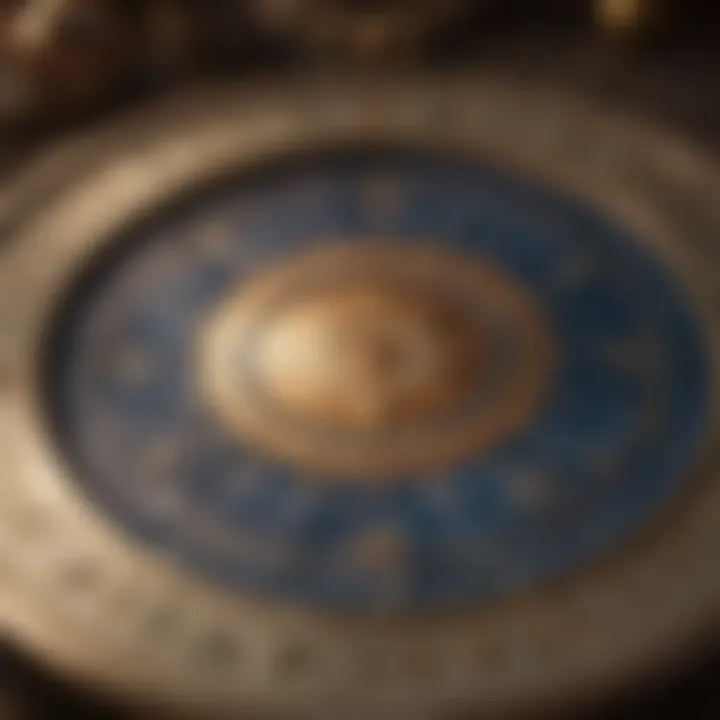Understanding Your Daily Horoscope: Insights and Implications


Intro
Daily horoscopes are more than mere entertainment. For many, these predictions offer a glimpse into the influences that shape their lives. Understanding how to interpret these daily insights can unlock a deeper appreciation of astrology's role. This section lays the groundwork for a comprehensive exploration of horoscopes, offering clarity on crucial concepts, zodiac signs, and the significance of celestial events.
Astrological Concepts
Definition of Key Terms
Astrology is rich with terminology. Some key terms include:
- Zodiac: A circle of twelve 30-degree divisions, each corresponding to one of the twelve signs.
- Ascendant: The zodiac sign rising on the eastern horizon at the time of a person's birth, influencing personality and outward behavior.
- Transit: The movement of planets through the zodiac and their effect on individual horoscopes.
Historical Background of Astrology
Astrology dates back millennia, with roots in ancient civilizations. The Babylonians first recorded astrological predictions around the second millennium BCE. They observed celestial movements and their earthly implications. The Greeks later adopted these practices, integrating them with philosophy and mathematics. This historical backdrop shapes modern astrology, connecting past insights with present interpretations.
Overview of Different Astrology Branches
Astrology is not monolithic. Various branches exist, each with unique principles. Some major branches include:
- Natal Astrology: Focused on individual birth charts, analyzing personality and life events.
- Mundane Astrology: Concerned with world events and their correlation with celestial phenomena.
- Electional Astrology: Used to choose the most auspicious times for significant activities, such as weddings or business launches.
An understanding of these branches enriches the interpretation of daily horoscopes.
Zodiac Signs Exploration
In-Depth Analysis of Each Sign
Each zodiac sign comes with distinct qualities. The twelve zodiac signs are:
- Aries: Impulsive and energetic.
- Taurus: Steadfast and reliable.
- Gemini: Adaptable and communicative.
- Cancer: Emotionally intelligent and nurturing.
- Leo: Charismatic and creative.
- Virgo: Detail-oriented and analytical.
- Libra: Diplomatic and fair-minded.
- Scorpio: Intense and mysterious.
- Sagittarius: Adventurous and optimistic.
- Capricorn: Disciplined and ambitious.
- Aquarius: Innovative and humanitarian.
- Pisces: Intuitive and compassionate.
Personality Traits and Characteristics
Each sign influences personality traits. For example, Aries individuals may exhibit assertiveness, while Pisces might show empathy. Understanding these traits aids in interpreting daily horoscopes.
Historical and Mythological Connections
Astrology's roots connect deeply with mythology. Each sign often relates to a deity or mythological figure. For example, Leo connects with the myth of the Nemean Lion, showcasing courage and strength.
Celestial Events
Major Cosmic Phenomena
Celestial events, such as eclipses and retrogrades, dramatically influence daily horoscopes. Solar and lunar eclipses signify important changes. Planetary retrogrades, like Mercury retrograde, signal periods of reflection and reassessment.
Impact of Celestial Events on Astrology
These phenomena are less random and more integral to astrology. Astrologers monitor these events to guide their interpretations, highlighting specific trends or shifts in energy.
Rituals and Practices During Celestial Events
Many engage in rituals during significant astrological events. These may include:
- Cleansing Spaces: Removing negative energy prior to an eclipse.
- Setting Intentions: Particularly around New Moons for new beginnings.
- Meditation: For grounding and reflection during retrogrades.
Engaging with these practices enhances insights gleaned from daily horoscopes.
Understanding daily horoscopes involves grasping key astrological concepts, zodiac characteristics, and the effects of celestial events. Each aspect contributes to a richer reading, serving both personal development and decision-making.
Preface to Horoscopes
The study of horoscopes is a fascinating journey into human behavior and the cosmos. Horoscopes can provide valuable insights about one's daily life and personal trends. They guide individuals in understanding possible influences from celestial bodies. Knowing these factors aids in making informed decisions. Therefore, an understanding of horoscopes can empower individuals in various aspects of their existence.
The Origins of Astrology
Astrology has ancient roots, tracing back to various civilizations. The Babylonians were among the first to document celestial phenomena around the second millennium BCE. They observed patterns in the stars and planets, linking them to earthly events. This knowledge spread through cultures, evolving over centuries. Ancient Greeks integrated astrology with philosophy, refining its principles and contributing new ideas.


Astrology has since taken many forms, influenced by cultural, religious, and intellectual contexts. While some may dismiss it as superstition, its historical significance remains profound. This practice invites reflection on humanity's relationship with the universe. The origins reveal a desire to understand our place in a vast cosmos.
What Constitutes a Horoscope?
A horoscope is a symbolic chart or diagram that represents the position of celestial bodies at a specific time and place. Usually, it focuses on a person's birth, marking the moment they entered the world. This chart includes the sun, moon, planets, and angles that offer insight into personality and life experiences.
Key components include:
- Zodiac Signs: Twelve segments that correspond to specific time frames of the year, tying to personal traits and tendencies.
- Houses: Divisions within the chart indicating different life areas, such as career or family.
- Planets: Each celestial body represents different aspects of personality and influences.
Understanding these elements allows for deeper interpretations of daily horoscopes. They showcase how planetary movements influence current situations or moods.
In sum, the intricate makeup of a horoscope provides a comprehensive look at individual potential and growth paths.
Understanding Zodiac Signs
Understanding zodiac signs is essential for anyone delving into astrology. Each sign represents distinct characteristics, strengths, and weaknesses in individuals. Recognizing these traits can enhance the daily horoscope experience by offering personalized insights. For instance, knowing whether someone is a Taurus or a Scorpio can guide interpretations of daily predictions; they may react differently to similar circumstances.
Zodiac signs also facilitate connections among individuals, leading to better understanding of interpersonal dynamics based on astrological profiles. This overview provides a fundamental framework necessary to navigate the more complex aspects of astrology.
A Brief Overview of the Twelve Zodiac Signs
Each of the twelve zodiac signs has unique attributes:
- Aries: Energetic and assertive, often leaders in their endeavors.
- Taurus: Dependable, with a strong appreciation for comfort and beauty.
- Gemini: Versatile and communicative; they thrive on social interactions.
- Cancer: Intuitive and sensitive, often prioritizing family and close relationships.
- Leo: Charismatic and confident; they seek recognition and love.
- Virgo: Detail-oriented and practical, often perfectionistic.
- Libra: Diplomatic and fair, they value harmony and partnerships.
- Scorpio: Intense and passionate, often mysterious and deep.
- Sagittarius: Adventurous and freedom-loving; they seek knowledge and experience.
- Capricorn: Disciplined and ambitious; they are natural achievers.
- Aquarius: Innovative and independent, often seen as forward-thinkers.
- Pisces: Compassionate and artistic; they are highly empathetic.
Understanding these unique characteristics is crucial for interpreting horoscopes accurately and applying them to real life.
Elemental Correspondences
Each zodiac sign is associated with one of four elements: fire, earth, air, and water. These elements further influence the traits of each sign:
- Fire (Aries, Leo, Sagittarius): Dynamic and passionate; people of fire signs often approach life enthusiastically.
- Earth (Taurus, Virgo, Capricorn): Grounded and practical, individuals with earth signs tend to be reliable and methodical.
- Air (Gemini, Libra, Aquarius): Intellectual and communicative; air signs cherish ideas and social exchanges.
- Water (Cancer, Scorpio, Pisces): Emotional and intuitive; water signs connect deeply with their feelings and those of others.
Understanding elemental correspondences aids in evaluating personality traits and behaviors, allowing for an enriched interpretation of daily horoscopes.
Modality and Its Relevance
Astrological modalities—cardinal, fixed, and mutable—provide insight into how each sign approaches change and adaption:
- Cardinal (Aries, Cancer, Libra, Capricorn): These signs are initiators and often take charge in changing situations.
- Fixed (Taurus, Leo, Scorpio, Aquarius): They are steadfast and resistant to change, valuing stability.
- Mutable (Gemini, Virgo, Sagittarius, Pisces): Adaptable and flexible, they often embrace change and uncertainty.
By understanding modality, one can better appreciate how different signs influence decisions and behaviors. This is particularly relevant when analyzing daily horoscopes, as it reveals potential responses to planetary movements and personal scenarios.
Gaining insights from understanding zodiac signs allows individuals to tailor their responses based on specific astrological traits, making daily horoscopes more relevant and impactful.
The Structure of Daily Horoscopes
Understanding the structure of daily horoscopes is essential for effective interpretation. The way horoscopes are constructed significantly impacts the insights they can provide. A structured approach allows readers to grasp the underlying astrological influences, making it easier to apply these findings to real life. This section will analyze the components involved in daily horoscopes and how to interpret their unique language for better personal insight.
Components of a Daily Horoscope
Planetary Positions
Planetary positions refer to the location of celestial bodies at a given moment. This aspect is crucial for understanding how these placements influence your life on a daily basis. Each planet carries specific energetic traits. For example, Mars symbolizes assertiveness while Venus represents love and beauty. Knowing where these planets are positioned in relation to your zodiac sign can reveal a lot about your emotional landscape and day-to-day experiences.
One key characteristic of planetary positions is their dynamic nature. The movements of planets can change, leading to shifting influences. This is beneficial because it offers constant updates on how energies are affecting you. The unique feature of planetary positions is their individual influence on various areas of life, such as relationships and career decisions. The disadvantage here lies in the fact that interpretations can become too nuanced, complicating the logical understanding of daily horoscopes.
Transits and Aspects
Transits and aspects examine how planetary movements interact with your natal chart, providing more details about daily influences. Transits occur when planets move through different signs, affecting the energy in your horoscope. Aspects are angles formed between planets, indicating harmonious or challenging influences. These contribute significantly to the overall purpose of today's reading, revealing opportunities and challenges you may encounter.
One of the prominent characteristics of transits and aspects is their ability to cause immediate effects in life situations. This immediacy makes them a popular choice for analysis in daily horoscopes. The unique feature here is their dual nature – they can be harmonious, encouraging growth, or difficult, prompting challenges that necessitate growth. On the downside, misreading these influences can lead to misinterpretations and misguided actions.
Interpreting Horoscope Language
Deciphering the language of horoscopes requires familiarity with specific astrological jargon and symbols. Each word and phrase carries significant weight in detailing potential energies and directions. Understanding this language can enable readers to better connect with the insights provided by their daily horoscopes. By developing this skill, individuals can create more personalized interpretations tailored to their unique situations.
The Role of Planetary Movements


The movements of planets hold significant weight in astrological practice. Each planetary shift has distinct implications that resonate with the energy present in daily life. By understanding these movements, individuals can gain insight into their own circumstances and experiences. Planetary movements are not merely astronomical phenomena; they directly influence how we perceive and navigate our daily challenges.
The role these movements play in daily horoscopes can be understood through their components, such as retrogrades and lunar phases. Emphasizing these elements can enhance one’s ability to interpret horoscopes accurately, leading to more informed decisions based on astrological insights. Furthermore, recognizing the cyclical nature of these movements allows for a structured approach to personal growth and awareness.
Understanding Retrogrades
Retrogrades occur when a planet appears to move backward in its orbit from our perspective on Earth. This astrological phenomenon often causes disruptions and challenges in the areas associated with the retrograde planet. For instance, the retrograde of Mercury is notorious for causing communication issues, technical difficulties, and misunderstandings. It’s advisable to approach tasks involving communication and technology with caution during this time.
Many astrologers view retrogrades as periods for reflection, review, and reassessment. Instead of embarking on new ventures, individuals can use this time to consolidate their current projects, resolve past issues, and let go of outdated beliefs. Understanding retrogrades can help individuals navigate their emotional landscapes and prepare for future growth.
Influence of Lunar Phases
The lunar phases provide another essential layer to the understanding of planetary movements. The Moon progresses through phases that impact our emotions, intuition, and overall energy. New Moons represent beginnings, making them ideal for setting intentions. Conversely, Full Moons often signify completion and release, serving as times for letting go of what no longer serves us.
Many people find that their moods fluctuate with the lunar phases. Awareness of these influences can guide daily activities and personal reflections. For example, planning significant events around a New Moon can harness its initial energy, while using the energy of a Full Moon to conclude tasks can ease transitions.
Awareness of planetary movements can lead to insightful interpretations and a more profound understanding of one's personal journey.
Tips for Reading Your Horoscope
Reading a daily horoscope goes beyond mere prediction; it requires careful consideration and personal involvement. Approaching your horoscope with the right tips can lead to more meaningful insights and applications in everyday life.
Contextual Awareness
Contextual awareness is pivotal in understanding your daily horoscope. Horoscopes are not written in a vacuum. They are influenced by various factors, including current events, personal life situations, and even emotional states. To comprehend what a horoscope means for you, one must think about current circumstances. This means considering your ongoing relationships, work obligations, and even recent challenges. By applying this lens, you can assess how astrological predictions align with your life.
Take notes on how your horoscope's guidance seems to resonate with real situations. Perhaps a warning about communication issues relates to recent conversations with colleagues. Keeping track of these patterns helps to deepen the understanding of astrology's influence on daily choices.
Personal Reflection
Personal reflection plays a vital role in interpreting horoscopes. Each horoscope offers a unique message, but its significance varies per individual. After reading your daily horoscope, pause and ask yourself how the predictions and advice relate to your life. Reflect on what resonates with you emotionally and intellectually.
This process is a dialogue between you and the horoscope, creating a reflective space for insight. It is beneficial to maintain a journal for these reflections. You can write down how you feel about daily predictions and how they impact your decision-making. The more you engage with your horoscope, the more clarity you will find.
Balancing Skepticism and Belief
Balancing skepticism and belief is critical when reading horoscopes. While it is easy to dismiss astrology as mere superstition, there is wisdom to be found in its teachings. A healthy skepticism should not blind you to potential personal growth. Conversely, blind acceptance of every prediction can lead to disappointment.
Understanding that astrology functions on interpretation can help in this balancing act. Realize that horoscopes offer guidance rather than certainties, allowing room for individual agency. For effective engagement, acknowledge your critical thoughts while remaining open to the lessons astrology might provide.
“Astrology offers pathways for personal insight; the key lies in how selectively we receive its messages.”
By maintaining this delicate balance, you can appreciate the role astrology plays in your life without losing sight of rational thought. This allows for meaningful interpretations that align with your values and experiences.
Astrology in Everyday Life
Astrology plays a significant role in the everyday experiences of many individuals. It provides insights into human behavior, emotional responses, and life challenges. For those who engage with astrology, daily horoscopes can serve as both guidance and reflection. This section will explore how astrology can influence personal growth and decision-making in daily life.
Using Astrology for Personal Growth
Engaging with astrology allows individuals to explore their inner selves. By understanding their zodiac signs and planetary influences, people can identify their strengths and weaknesses. This conscious awareness promotes self-acceptance and encourages growth.
- Self-Reflection: Reflecting on horoscopes can help one evaluate their life choices. If readings suggest a period of introspection, it may be a good time for personal reflection.
- Setting Goals: Astrology can aid in setting personal goals that align with cosmic timing. For example, launching new projects during favorable astrological transits could lead to better outcomes.
- Emotional Awareness: Users of astrology often find patterns in their emotional responses. Recognizing these patterns can foster emotional growth and resilience.
By incorporating astrology into life, individuals may find a structured approach to their personal development.
Astrology and Decision-Making
Astrology can provide a unique perspective when it comes to making decisions. When individuals consider astrological insights, they often develop a more nuanced understanding of their choices.
- Timing Considerations: Certain days may be more favorable for specific undertakings according to astrological events. Engaging with these insights can enhance decision-making processes.
- Understanding Dynamics: Astrology helps explain interpersonal dynamics. By comprehending the astrological traits of others, one can tailor their interactions for better outcomes.
- Risk Assessment: By analyzing the transits and aspects relevant to a situation, individuals may assess potential challenges better. This allows for informed and balanced risk-taking.
Astrology does not guarantee success, but it offers a framework that can guide decisions through cosmic awareness.
Engage with astrology as a tool for navigating life’s choices, leading to more fulfilling experiences.
In summary, utilizing astrology in everyday life enriches the understanding of ourselves and our surroundings. Both personal growth and decision-making can benefit from these insights, making astrology a valuable companion for those willing to explore its depths.


The Community of Astrology Enthusiasts
Astrology is not just about charts and celestial bodies; it is a shared experience that draws people together. The community of astrology enthusiasts serves as a vital support system. Engaging with others who share a common interest in astrology can provide numerous benefits, from gaining insights to exchanging knowledge. Connecting with like-minded individuals fosters a sense of belonging. Here are a few specific elements that highlight the importance of this community:
- Shared Knowledge: Engaging in discussions allows members to share their interpretations and insights about horoscopes and astrological phenomena. This exchange can enhance the understanding of various astrological concepts.
- Support Systems: Emotional support is often found within these communities. Astrology can influence personal experiences, and having a community that comprehends these effects can be beneficial.
- Resource Sharing: Enthusiasts often share valuable resources, be they articles, books, or even personal experiences. Having access to curated information is invaluable in a field as expansive as astrology.
Online Resources and Forums
The internet has transformed how individuals access information about astrology. Online resources, including forums, blogs, and social media platforms, provide a space for astrology enthusiasts to connect and exchange ideas. Websites like Reddit feature dedicated communities where members can post questions, share experiences, and discuss various astrological topics. Here are a few advantages of these online platforms:
- Accessibility: Resources are available at any time, making it easy for anyone to learn about astrology.
- Diverse Perspectives: Online forums often welcome individuals from diverse backgrounds, fostering rich discussions and unique interpretations.
- Anonymity: Some may find it easier to discuss personal topics anonymously, allowing for open and honest exchanges without judgment.
Local Astrology Groups and Events
In addition to online connections, local astrology groups and events offer tangible opportunities for interaction. Engaging with local enthusiasts can deepen knowledge and provide a platform for personal growth. These gatherings can take various forms, such as workshops, lectures, or social events. Key considerations for participating in local groups include:
- Networking Opportunities: Meeting face-to-face fosters connections that may lead to partnerships or mentorships within the astrological field.
- Interactive Learning: Local events often promote interactive experiences, providing participants with practical knowledge through hands-on activities.
- Community Involvement: Being part of a local group can enhance feelings of community and belonging, while also encouraging personal exploration of astrological practices.
In summary, the community of astrology enthusiasts, both online and offline, plays a crucial role in the broader understanding of astrology and daily horoscopes. By tapping into these networks, individuals can expand their knowledge, share experiences, and find support in the complexities of astrological interpretations.
Myths and Misconceptions about Horoscopes
Understanding the myths and misconceptions about horoscopes is crucial for anyone interested in astrology. These misunderstandings can shape attitudes and behaviors, leading to either skepticism or blind faith. By examining these misconceptions, individuals can develop a more grounded perspective on horoscopes and their relevance.
Astrology vs.
Science
One of the most common points of contention is the relationship between astrology and science. Critics argue that astrology lacks scientific validity. They emphasize that scientific inquiry relies on empirical data and repeatable results. In contrast, astrology operates on the belief that celestial bodies influence human behavior and events. While astrology does not fit neatly within scientific paradigms, it offers a different way of interpreting life experiences.
- Astrology draws from ancient traditions and historical practices.
- It incorporates psychological insights, which science increasingly acknowledges.
- Many practitioners see it as a symbolic language rather than a predictive science.
Therefore, rather than dismissing astrology outright, it may be beneficial to explore its frameworks and methodologies. This nuanced understanding invites a broader dialogue about the interplay between human experience and the cosmos.
Generalizations and Stereotypes
Generalizations about horoscopes often lead to oversimplification of complex traits. Many people pigeonhole zodiac signs into rigid stereotypes. For example, Libra may be viewed solely as indecisive or Scorpio as overly secretive. These stereotypes can create unfair expectations and limit nuanced understanding of personality traits.
To counteract these generalizations, consider the following:
- Each individual is shaped by multiple astrological factors, including their full birth chart, not just their sun sign.
- Cultural context plays a significant role in how personality traits are expressed.
- Life experiences and personal choices also shape behavior more than astrological influences alone.
Engaging with horoscopes requires acknowledging these complexities. When reading horoscopes, remember that they serve as a guide, not a strict definition of who you or others may be. By dispelling myths and misconceptions surrounding horoscopes, readers can cultivate a genuine connection with astrology and its potential benefits.
The Future of Astrology
Astrology is a system that has withstood the test of time, yet it is constantly evolving. Understanding the future of astrology is crucial for both practitioners and enthusiasts. As the world changes, so too does the context in which astrology operates. Global events, technological advancements, and shifting societal values all influence how astrology is perceived and practiced. This section will examine the emerging trends in astrological practices and the integration of technology into this ancient discipline.
Trends in Astrological Practice
Astrological practice is seeing a resurgence, especially among younger generations. Interest is fueled by the increasing accessibility of astrological tools and resources. Some notable trends include:
- Personalized Astrology: There is a growing trend toward personalized readings. Individuals are looking beyond generic horoscopes to obtain insights tailored specifically to their natal charts.
- Astrology in Wellness: Many are incorporating astrology into wellness and self-care practices. This includes using astrological insights for mental health, relationship dynamics, and personal development.
- Educational Platforms: Websites and courses dedicated to teaching astrology have become popular, making knowledge more accessible. This trend empowers individuals to explore astrology independently.
As these practices evolve, the community becomes more engaged. People are forming connections based on shared astrological interests, creating a rich space for discussion and exploration.
Integrating Technology with Astrology
The digital age has brought significant changes to how astrology is practiced and understood. Integration of technology is not just a trend; it is transforming the astrological landscape. Consider the following points:
- Mobile Apps: Numerous applications now provide daily horoscopes, compatibility reports, and natal chart readings. Apps like Co-Star and AstroFuture have made astrology more approachable.
- Social Media: Platforms like Instagram and TikTok are increasingly used to share astrological insights. Short, engaging content helps demystify astrology and reach a broader audience.
- Astrological Software: Astrologers utilize advanced software for chart calculations and interpretations. Tools such as Solar Fire and AstroGold have enhanced accuracy and efficiency in practice.
The future of astrology lies in its ability to adapt and integrate with new technological advancements. This adaptability ensures that astrology remains relevant in contemporary society.
Finale
Understanding the significance of daily horoscopes brings clarity to the complex world of astrology. This article emphasizes that horoscopes are not mere entertainment; they serve as valuable tools for personal insight and reflection. By comprehending their components and dynamics, individuals can align their daily actions with broader cosmic movements.
The Enduring Appeal of Horoscopes
Horoscopes have captivated humanity for centuries. The allure of these daily readings lies in their ability to provide a structured lens through which to view life's challenges and opportunities. Many individuals find comfort in the predictive nature of horoscopes, which offer suggestions on how to navigate daily interactions and decisions. Beyond superstition, there is an inherent wisdom in being part of a cosmic cycle, as it imbues life with meaning. Astrology, when approached with a critical mind, offers insights that can lead to meaningful self-discovery. It connects individuals to a larger universe, often fostering a sense of community.
Final Thoughts on Daily Readings
Daily horoscopes are not definitive answers but guides that encourage personal reflection. They prompt individuals to consider their experiences and emotions in the context of astrological influences. Engaging with these readings fosters greater self-awareness, potentially revealing patterns and trends in one’s life. It’s important to recognize that while horoscopes can guide, they should not dictate or restrict choices. Ultimately, the power lies in the reader’s interpretation and application of the insights offered. Embracing both belief and skepticism can lead to more profound understandings of oneself and the surrounding world. The journey of astrology is as important as the destination, enriching the everyday experience of those who choose to engage with it.







